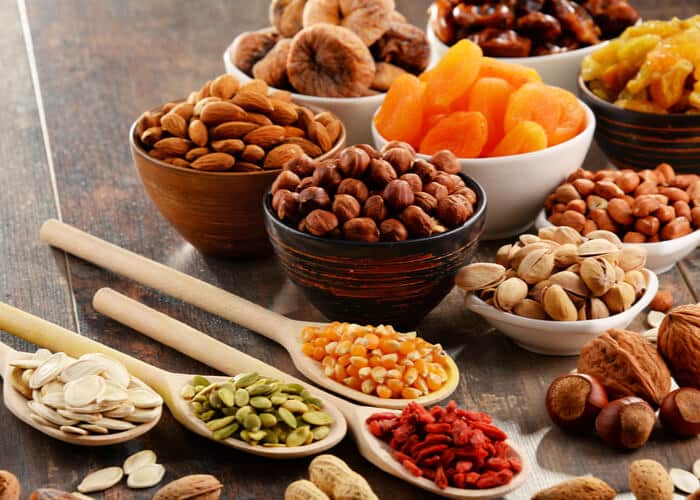Blog
How to select and store dry fruits?

Dry fruits are one of the most nutritious foods on earth. They have a high content of vitamins, minerals and fiber, which help in digestion and also prevent constipation. But they are also commonly known as “desi” (Indian) or “raw” nuts because people eat them as snacks by just shelling them off the shell and eating them right away. However, there’s more to dry fruits than just snacking on them like peanuts! In this article we will discuss some important points about selecting dry fruits that you should consider before buying from the market. Dry fruits are often confused with fresh fruits, but they are quite different from each other. Fresh fruit is a whole product that is juicy and soft to eat while dry fruits are dried out into small pieces and have a hard shell covering them.
Selecting
Selecting, choosing and purchasing dry fruits is an art. One should look for the following qualities in dry fruits:
- Quality and freshness – The best way to check for quality is by smelling the dry fruits. If they have no smell or have a stale odor then avoid buying them unless you like the taste of stale foods! You can also check the color of your selected fruit; it should not be too dark or light in color as this may indicate poor quality product.
- Appearance – It’s important that you choose only those which are bright in appearance as well as shiny on their surface without any blemishes or marks on them (unless you want them for making jewelry).
Storing
- Place dry fruits in airtight containers.
- Store the containers at room temperature in a cool, dry place away from direct sunlight and moisture.
Freezing
Freezing is the best way to preserve dry fruits. It prolongs their shelf life and prevents them from becoming rancid.
- Freeze in airtight containers or freezer bags, using a food vacuum sealer if possible. Label each container with the name of the fruit, date frozen, and quantity (for example: “Almonds 1 lb.”).
- Dry fruits such as nuts should be blanched before freezing; fruits like raisins do not need blanching because they’re already soft enough without boiling water poured over them.
The takeaway here is that you want to store your dry fruits in a cool, dry place. If you’re going to freeze them, make sure they’re frozen solid before putting them in an airtight container and storing in the freezer. If you don’t have time for this process, just buy what you need and use it quickly–a few days from purchase is ideal. If you’re wondering whether or not you should buy frozen fruits, then the answer is yes. Frozen fruits are just as nutritious as fresh produce and can be just as tasty, too. Plus, they’re easy to store and keep for a long time–so make sure you stock up on them so you always have some on hand!
We hope that you have found this article helpful. We know it can be confusing to know what the best type of dry fruits are, how they should be stored and how long they will last. But don’t worry–we’ve got all the answers! If you want to know more about the health benefits of dry fruits and how they can help you live a healthier life, then make sure you keep reading!
FAQs on Storing Dry Fruits in Fridge:
- Can I store dry fruits in the fridge? Yes, you can store dry fruits in the fridge to extend their shelf life and prevent spoilage.
- What is the best way to store dry fruits in the fridge? It is best to store dry fruits in airtight containers or resealable bags to keep moisture out.
- How long can I store dry fruits in the fridge? Dry fruits can be stored in the fridge for up to six months, but it’s best to check for signs of spoilage before consuming.
- Should I wash dry fruits before storing them in the fridge? It’s not necessary to wash dry fruits before storing them in the fridge, but if you do, make sure they are completely dry before storing.
- Can I freeze dry fruits instead of storing them in the fridge? Yes, you can freeze dry fruits for even longer shelf life, but make sure they are stored in airtight containers or resealable bags to prevent freezer burn.
- Is it safe to store all types of dry fruits in the fridge? Yes, it’s safe to store all types of dry fruits in the fridge, but keep in mind that some fruits may absorb odors from other foods.
- Should I remove the dry fruits from their original packaging before storing them in the fridge? It’s best to transfer dry fruits from their original packaging to airtight containers or resealable bags to prevent moisture and keep them fresh.
- Can I store dry fruits in the fridge for baking purposes? Yes, storing dry fruits in the fridge before baking can help prevent them from sticking together and becoming clumpy.
- What is the ideal temperature for storing dry fruits in the fridge? The ideal temperature for storing dry fruits in the fridge is between 32-40 degrees Fahrenheit (0-5 degrees Celsius).
- How can I tell if my dry fruits have spoiled? Signs of spoiled dry fruits include a rancid or sour smell, a change in color, and the presence of mold or insects. If you notice any of these signs, discard the fruit.
I hope this helps! Let me know if you have any other questions.


